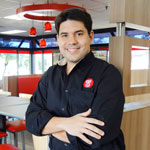Ricardo Anzaldua on the pivotal moments of his career that led him to advise insurance giant MetLife as executive vice president and general counsel
Ricardo Anzaldua was editing publications for the Center for U.S.-Mexican Studies, a think tank at the University of California San Diego, when he received the best advice of his career. “One of the think tank’s visiting fellows, Ralph Reisner, who was a professor at Northwestern University Law School, suggested that I go to law school, then work for a firm in the business of advising foreign sovereigns on development and financing issues,” Anzaldua recalls.
It was pivotal moment: Anzaldua took Reisner’s advice and entered law school in the fall of 1987 and, after a series of well-timed career moves, is now executive vice president and general counsel for insurance giant MetLife, Inc., a position he says was too amazing to pass up. “MetLife is a global company with more than 60,000 employees and 90 million customers, and it’s at the forefront of some of the principal financial regulatory issues of our generation, including the designation of entities as too big to fail,” he says. “It is orders of magnitude larger and more complex than anything I’d done previously, and that presented a challenge that was irresistible.”
Looking at Anzaldua’s current role—which he says requires him to “project and inspire confidence in the senior leadership of a complex organization by walking into a room, to listen to complex questions, think on my feet, and respond convincingly and articulately”—you’d never guess how humble were his beginnings.
Born in Albuquerque, New Mexico, Anzaldua spent summers in high school picking fruit and helping his father and uncles work their small herd of cattle. “Those experiences taught me a great deal about singleness of purpose, determination, and self-reliance,” he says. “My dad and his brothers worked hard and focused on their families, and made a lot of sacrifices so their children could have the best education possible.”

Anzaldua planned on becoming fighter pilot, but left the US Air Force Academy when he failed a color blindness test. While exploring other colleges, Anzaldua worked in the infant Silicon Valley micro-integrated circuits industry. He landed at Brown University, where he received a bachelor’s degree in Latin American studies and wrote his thesis in economics. The combined topics were so compelling to Anzaldua that he decided to pursue graduate studies in Latin American history at the University of California San Diego. “I couldn’t pass up a fellowship that allowed me to research and write about development issues, especially immigration from Mexico to the United States,” he says.
When Anzaldua submitted his writing to the Center for U.S.-Mexican Studies, it offered him a full-time position editing its publications. The timing was serendipitous. “I’d come to the decision that I didn’t want to be a professor, and that had left me looking for another challenge,” he says.
Three years later, the Latin American debt crisis led Anzaldua to another career examination. Latin American sovereigns that had used bank debt to finance economic development had fallen on hard times and were defaulting on those bank loans; Anzaldua wanted to have influence over the ensuing policy debates. In his position at the Center for U.S.-Mexican Studies, however, that was unlikely. “By that time, I had learned a dirty little secret about academic publishing: that it’s a small world, with many titles directed at a universe of around 50 to 100 readers,” he says. “We could probably get the information to our readers more economically by calling them up and telling them.”
It was thus that Anzaldua ended up at law school at Harvard, and subsequently began working for Cleary, Gottlieb, Steen & Hamilton, an international firm that advised foreign sovereigns on development and financing issues. His first assignment was representing the government of Kuwait, which was in exile during the Iraqi invasion. “I helped the government negotiate the goods and services they needed to liberate Kuwait, everything from drinking water to mobile hospitals to munitions,” he says. After six months, Anzaldua was tapped for a new assignment, representing the government of Mexico in the North American Free Trade Agreement (NAFTA) negotiations. “The process took nearly four years, but we wrote a seminal chapter of the free-trade agreement, which was preserved virtually without change for subsequent use in free-trade agreements with other countries, including Chile and South Korea,” he says.
After Anzaldua had been at Cleary for 15 years—where he’d made partner—he began wondering if the firm was the terminal place for his career. Seeking possibilities that might give him another experience, he learned of a job at The Hartford Financial Services Group, working for Neal Wolin, who had been general counsel of the US Treasury Department under President Bill Clinton. “I met him, got the lay of the land, and decided it would be a great opportunity to go in house and learn about how corporate clients implemented the kinds of advice I’d been giving them from the outside,” says Anzaldua, who started in 2007 as leader of The Hartford’s corporate legal function.
When he arrived in 2007, Anzaldua had targeted succeeding Wolin as general counsel, but Wolin retired four months later, and Anzaldua wasn’t ready for the job. He ended up working for Alan Kreczko, and was indicated as his successor, largely through his leadership of the company through the financial crisis. Five years later, however, another opportunity arose. “I was happy at The Hartford, but fell into the net of MetLife’s search for a general counsel to succeed Nicholas Latrenta,” he says of the opportunity. In addition to the chance to lead the legal efforts of a global financial-services company, Anzaldua loves the ability the role affords him to create an incubator of talent and development. “The thing that inspires me the most about this job, apart from the thrilling challenge of advising such a large organization, is the ability to help people develop themselves professionally,” he says.
To those seeking to follow in his footsteps, Anzaldua suggests thinking through what a general counsel of a public company needs to do. “You have to understand corporate governance, SEC reporting, leading and managing personnel, to start,” he says. “From there, it’s important to have a substantive background in the legal issues of the particular company for which you want to work. For example, if you’re working for a company that operates in a litigious space such as insurance, experience managing litigation matters is also an important skill.”
Check out all of Hispanic Executive‘s 2013 Top 10 Líderes here.

